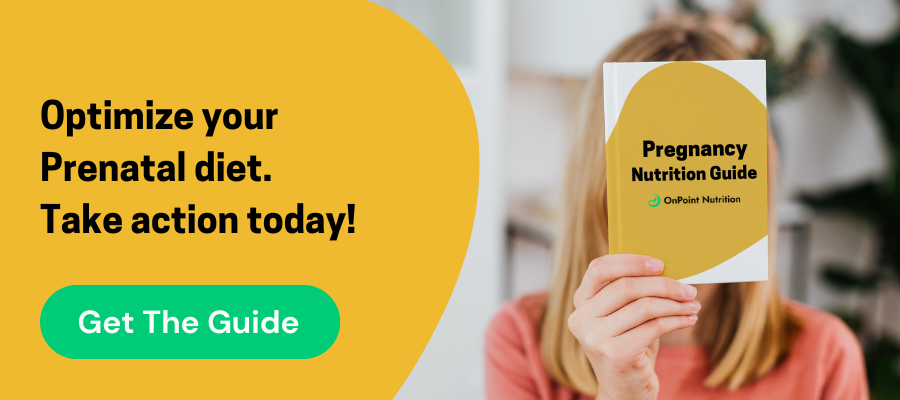
Consuming a healthy, well-balanced, nutrient-rich diet is crucial for the health of moms-to-be and their babies. While pregnancy nutrition isn’t a one-size-fits-all approach, there are some key concepts to keep in mind when eating during pregnancy.
Defining Real Food
In general, eating “real food” is considered a healthy practice. However, the definition of real food is a gray area within nutrition. Here are a few ways to evaluate how “real” your diet is.
- Nutrient-rich foods also referred to as nutrient-dense foods, contain many nutrients. Nutrients are broken down into two categories: Macronutrients, which include carbohydrates, proteins, and fats, and micronutrients, which include vitamins and minerals.If a food is high in vitamins, minerals, fiber, protein, and/or healthy fatty acids, it is considered nutrient-rich. On the flip side, if the food does not contain many of these components, it is considered nutrient-poor. Most real foods are nutrient-dense foods that help nourish your body.
- Whole foods are foods that are consumed in a similar form to how they appear in nature. Most whole foods do not contain added sugars, processed carbohydrates, added colors or flavors, or other manufactured ingredients. Most whole foods are naturally nutrient-dense; real foods include fruits, vegetables, nuts, seeds, beans, dairy, meat, poultry, and seafood.
- Unprocessed foods, like whole foods, are not modified and they appear similar to how they do in nature. In our society, many foods are processed until they are barely recognizable from their original form, and wouldn’t fit the real food definition.
Why Real Foods during Pregnancy?
Consuming real, nutrient-dense, whole foods gives your body the nourishment it needs to grow a healthy baby. As a mom with healthy food intake and healthy nutrient stores, your baby’s health will be optimized as well. Real foods also help protect against anemia during pregnancy and reduce the risk of pregnancy complications including gestational diabetes, preeclampsia (high blood pressure), and preterm labor. Optimizing your diet during pregnancy also helps with post-partum recovery.
A Well-Balanced Pregnancy Diet
You can use these concepts to build a healthy, well-balanced pregnancy diet. Well-balanced meals and snacks are an important part of a healthy diet for everyone, but even more important during pregnancy. Generally, combining real foods into nourishing meals and snacks is a healthy way to approach nourishing your body throughout pregnancy.
In general, eat a varied diet that contains nutrient-dense foods including:
- Fruits and vegetables for micronutrients and fiber.
- Complex carbohydrates for iron, B vitamins, folate, and fiber.
- Lean proteins to support your baby’s optimal growth and development.
- Healthy fats to meet your energy needs and support your baby’s brain development.
Certain micronutrients are even more important during pregnancy. Some essential nutrients include:
- Vitamin A for your baby’s eyes and immune system.
- Vitamin D for your baby’s bone development.
- Calcium to work with vitamin D to form your baby’s teeth, bones, muscles, heart, and nerves.
- Choline for your baby’s brain development.
- Folate for your baby’s developing brain and spinal cord.
- Iron to support your increased blood supply as a mom-to-be.
Simple Changes
While it is helpful to know what you should eat, it’s also helpful to know what foods to limit. Generally, limiting processed foods is best for everyone, but especially for pregnant women hoping to optimize their diets. Instead of trying to avoid whole food groups, make small changes within each food group to make your diet more real food-based.
- Fruits and vegetables consumed in their whole form are the most nutrient-dense. Frozen fruits and vegetables also retain their nutrients, and are a great option. Unsweetened dried fruit also provides beneficial nutrients. However, be sure to look for unsweetened and no-added -sugar options to avoid added sugars. Fruit snacks, veggie chips, and other processed foods that seem to contain fruits and vegetables, but really don’t, should be limited.
- Carbohydrates fall into two main categories – whole grains and refined grains. Whole grains include whole-wheat bread and pasta, brown rice, oats, and quinoa. These grains are less processed and contain more beneficial nutrients. Refined grains are white bread, pasta, and rice, which are much more processed and lower in nutrients. Try choosing whole grains as often as possible.
- Proteins that are minimally processed are generally considered the healthiest protein options. Limiting processed meats (bacon, sausage) helps improve your overall diet quality.Lean cuts of beef or pork, poultry, and seafood are all good sources of protein during pregnancy. Plant-based proteins such as tofu and beans are also healthy choices.
- Eggs and dairy products are also beneficial healthy, whole foods during pregnancy. Consuming whole eggs and whole-milk dairy also helps improve overall nutrient intake. Eggs are one of the only dense food sources of choline, which is crucial for your baby's brain. Eating the whole egg provides you with the most choline. Consuming full-fat, whole-milk dairy provides your body with the fat needed to absorb vitamins A, D, E, and K.
- Healthy fats are an important contributor to your overall energy needs during pregnancy. Specifically, omega-3 fatty acids are necessary for healthy fetal brain development. Even more specifically, the omega-3 fatty acid docosahexaenoic acid (DHA) is crucial for your baby’s brain formation. Nuts, seeds, avocado, and fatty fish are all great sources of healthy fats during pregnancy. Although fish and shellfish are good sources of protein, healthy fats, and iron, there are risks of consuming certain types of seafood that may be high in mercury while pregnant.
Staying Realistic
While sticking to these recommendations would be ideal, pregnancy may pose challenges to getting the nutrients your body needs. Food cravings are common and may influence your food choices throughout your pregnancy. Food aversions are also common and may make some of the foods you know are healthy unrealistic for you at certain points in your pregnancy.
While it’s not a food, your prenatal vitamin is a key part of ensuring you are getting the nutrients you need regardless of what foods are realistic for you day-to-day. Prenatal vitamins provide you and your baby with the nutrients that are essential for pregnancy to ensure you are getting them daily. However, the nutrients in your food have a synergistic effect, and getting your nutrients from foods is generally preferred to consuming them in food supplements. Continue taking your prenatal, but do your best to eat a variety of real foods too. If you need support in deciding which prenatal to take, talk to your doctor or dietitian.
Topics

Liz has been reading nutrition labels since she learned how to read. Growing up with severe peanut and tree nut allergies she learned that it’s important to know what you are putting into your body. She made her first big lifestyle change as a freshman in high school, when she decided to become a vegetarian. However, it wasn’t until she took a food class in Italy as part of a study abroad program in college that it clicked in her mind that she wanted to make food and nutrition her career. Liz graduated from Penn State University in 2015 with a bachelor's degree in Nutrition, as well as a bachelor's degree in Marketing. She completed her dietetic internship with Aramark in Philadelphia, and her master's degree at Northeastern University shortly after.




